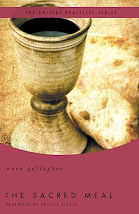Here are a couple of my "highlights" from those pages:
If you make up a bunch of rules about who gets to take Communion and who doesn't, then Communion is reduced either to a special club with only certain kinds of people who are allowed in or magic.
The gospel story that makes the most sense to me about the Eucharist is the feeding of the five thousand. Jesus didn't ask those thousands of people camped out on the hillside whether they had confessed their sins or how clean they were. He fed them.All of this got me remembering a meditation I wrote during seminary ... and today seemed like a good day to share that here.
It's called "Bread:
.

"I’ve always kind of had a thing about bread. As a child, I went off to school every day with peanut butter and jelly sandwiches – only Weber’s would do – with the crusts removed. The crusts were saved in a plastic bag in the freezer to take to the Arboretum to feed the ducks – fat, waddling, noisy old things who lived off the bits and pieces rejected by picky little girls like me. My early years were filled with an abundance of both bread and people who prepared it to my liking. Pudgy, indulged and privileged it seemed that bread – soft, white and usually smeared with something sweet – was something I would always relate to.
But it wasn’t until I got to seminary that I got the chance to actually bake any bread. It was an awesome privilege to be asked to bake the bread for communion and as I worked the dough on the floured board one morning it occurred to me that when the church becomes more like the bread that feeds it we will have inched closer to the coming of the kingdom.
The ingredients were set out, ready to be combined in the big, yellow mixing bowl: flour and shortening, sugar, salt and an egg – and yeast: turned frothy in the measuring cup of hot water. Separate and distinct when lined up on the counter, each of these items would serve a different but essential function when kneaded together into the dough that would become our bread.
The large pile of flower and the tiny packet of yeast were equal in importance: without either of them the final creation would be less than it was meant to be. Mixed together, kneaded and left to rise on the window sill in the afternoon sun and then baked in the heat of the over they would transformed into a new thing – brown and fragrant, crusty and warm – ready to be the food offered to feed both body and soul in a very hungry world.
The volume of the flour many times outweighed the other ingredients – but bread would not have happened if the flour had used its majority status to argue for the exclusion from the mixing bowl of the insistent salt or the disruptive yeast. Each had to play its own role in the process of becoming bread: to be wrenched from its own bag or box or packet or where it was comfortable with its own kind and combined with things which were “other.” And the bread which emerged from the oven resulted from the interaction of those ingredients as much as it did from the kneading and shaping of the baker or the heat of the oven.
As the church we are called to be the Body of Christ to the world – a body symbolized for us by the bread we break each time we gather. Yet how often we settle for my childhood relationship with the bread that God has given us. I know there are times when I am still that little girl who wants her bread the way she wants it: safe and familiar and prepared for me by someone else – sweet and with the crusts cut off! I don’t want to participate in the process: I just want to be fed by what I expect. Sure the ducks can have the leftovers – as love as I get mine first.
The radical transformation that takes place between the time the ingredients are lined up on the counter and the fragrant loaf emerges from the oven will never happen if I cling to that understanding of this bread God has given us to eat – of this body God has called us to be. It will never happen if we stay safe in our containers – wrapping creeds and formulas and ritual around us like the bad around the flour, protecting itself from the influence of the frothy yeast or the pungent salt – isolating ourselves from the very things that are essential to becoming the bread – the community -- God would have us be.
There’s a hungry world out there waiting to be fed and we’re the ones who have been called to feed it: both to offer and to be the bread of life. For God has called us to be a new thing – and to get there, we must first be mixed up, kneaded and punched, left to rise and then subjected to the heat of the oven. This is not exactly what I had in mind for my life, I can tell you – but yet I’ve always kind of had a “thing” about bread.






